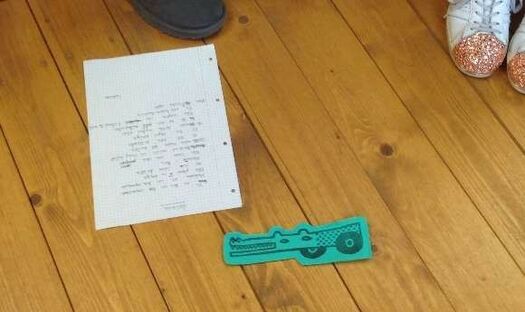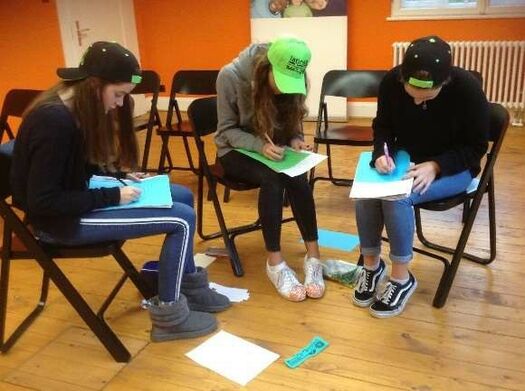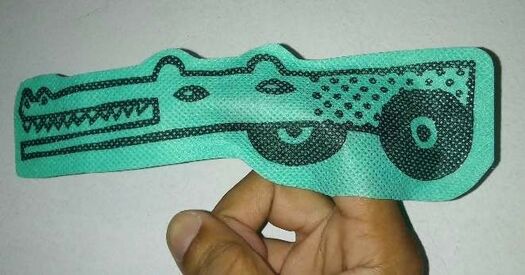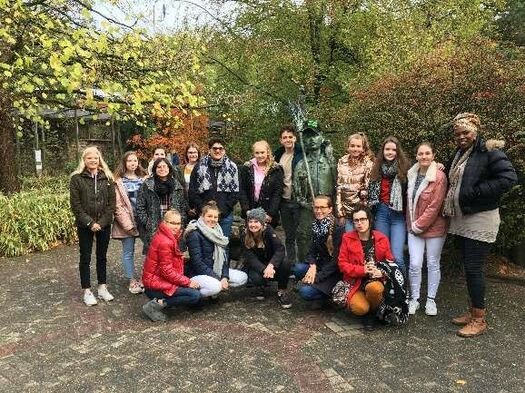Latinale 2018 Student Workshop




Latinale is a mobile Latin American poetry festival that took place for the 12th time in 2018. Its founding and headquarters are in Berlin; from there, it travels to other cities every year. Since 2012, the festival has made a guest appearance in Osnabrück. On the one hand, Latinale is a stage for Latin American poetry in Germany; on the other hand, the festival is a lively platform for the translation of Spanish-, Portuguese- and other-language poetic texts into German. One of Latinale's declared goals is to make current poetry from a culturally extremely fascinating continent, Latin America, known to a broad audience. In addition, Latinale promotes encounters between poets from this region and those from Germany and Europe as a whole. Since its founding in 2006, this has resulted in a large number of intercultural projects. The Berlin poet Tom Schulz and the Mexican poet and translator Daniel Bencomo, for example, have been working together continuously since their encounter at Latinale 2011. The same is true for Berlin poet Odile Kennel and Angélica Freitas or Érica Zíngano from Brazil.
Student work at Latinale 2018:
Funding from the Friedel & Gisela Bohnenkamp Foundation in 2018 made it possible for Latinale to focus on work with students* for the first time. In previous editions of Latinale, student workshops have certainly been part of the program alongside student workshops, but the deepening of this aspect through the duration of two full days and in a highly inspiring yet tranquil setting, Villa Hecker, home of the Bohnenkamp Foundation, was a novelty. During the days of October 23 and 24, 12 young people from Osnabrück had the chance to come into very close contact with poetic perspectives, poetic language, a foreign language familiar from teaching, and four poets. Participants were students from different classes of the grammar school "in der Wüste" Osnabrück. They were accompanied by their teacher Mrs. Menken. Teacher and students gave an extremely positive, if not enthusiastic feedback on the workshop.
The two workshop days built on each other. The first day, with its introductory and encounter character, was followed by a day in which the students responded increasingly independently and confidently to the poets and the text work. Queen Nzinga Maxwell from Costa Rica, for example, taught three students how to rap and the basics of spoken word. On the one hand, the students developed a new feeling for their body language and a playful approach to poetically useful spoken language, and on the other hand, a real 'coolness' towards the foreign language Spanish. All in all, both sides, authors and students, had an extremely harmonious, inspiring and productive encounter. In the chronicle that the author Ethel Barja wrote for Latinale, it says: "The time with the workshop participants in Osnabrück was like a continuous discovery; quite unexpectedly, we encountered many creative sparks."
The practical implementation of the poetic work in the workshop at Villa Bohnenkamp consisted of:
1. rounds of introductions on the topic: have I already had poetic experiences? What is a poetic experience anyway? Do I read poetry? At school? At home? In secret? With someone else? Do I write by myself? Would I like to write by myself? How do I start? How do I do it? Have I ever been to a poetry reading? Or at a slam competition? What do I ask the invited poets? Do I have the confidence to ask them in Spanish to tell me how they started writing poetry and how they still do it today?
2. a round of introductions, in which the poets answered these questions with questions of their own: How does the German language work? How can we build a bridge between German and Spanish? What can help us to overcome language barriers? En photo that we take together? The use of a dictionary app? Gestures, body language? Music? A drawing we create together? A collage?
3. Increasingly loose smaller working groups in which rapping, filming, writing, translating and crafting took place. The particular method(s) were suggested by the poets* and then decided together. The 'products' of this work were anticipated in interim summaries in the larger group. After a food trip to the zoo and viewing of professional poetry films and recitation of texts by the poets*, work continued - and in the end all results were enthusiastically presented. This round of presentations can be found recorded in several videos.
The guests in Osnabrück were:
Queen Nzinga Maxwell (real name: Wendy Maxwell), poet and artist from Costa Rica
Ethel Barja, poet and literary scholar from Peru
Diana Garza Islas, poet and literary scholar from Mexico
Yojan Murcia, poet from Colombia
The results are also available on the blog titled 'latinale.académica' at http://latinale-academica.eu/lateinamerikanische-lyrik-an-schulen-lesen/einsehbar.
Publications:
In addition to the Latinale blog(www.latinale.de), which announces the poets* of each year and the overall program of the festival, the reports and products of Latinale 2018 Osnabrück are published on the blog latinale-academica.eu. Latinale académica is a research project based at the University of Osnabrück, which deals with lyric texts in a literary-scientific and poetic-audio-visual way. The blog is a dynamic platform, a collection of texts about Latin American poetry, written by literary scholars, poets, students - and now also by students. This blog represents the virtual, hypertextual anthology of Latinale 2018. Its focus is on the didactics of poetry. Another Latinale 2018 anthology will be published by the Universidad del Norte in Barranquilla, Colombia, in Spanish and partly in English. Latinale is in academic exchange with this university. The students from the University of Osnabrück and other universities who participated in this international publication acted, among other things, as scouts for the workshop at the Bohnenkamp Foundation. They passed on their knowledge 'live' by accompanying the students in their encounters with the authors. With the book, these young poetry researchers now leave behind a lasting testimony that will be accessible in relevant libraries. In addition, this exchange opens up a perspective for students who want to get to know Latin America personally in the near future. There is a German school in Barranquilla, and the Universidad del Norte maintains a partnership with the University of Osnabrück.